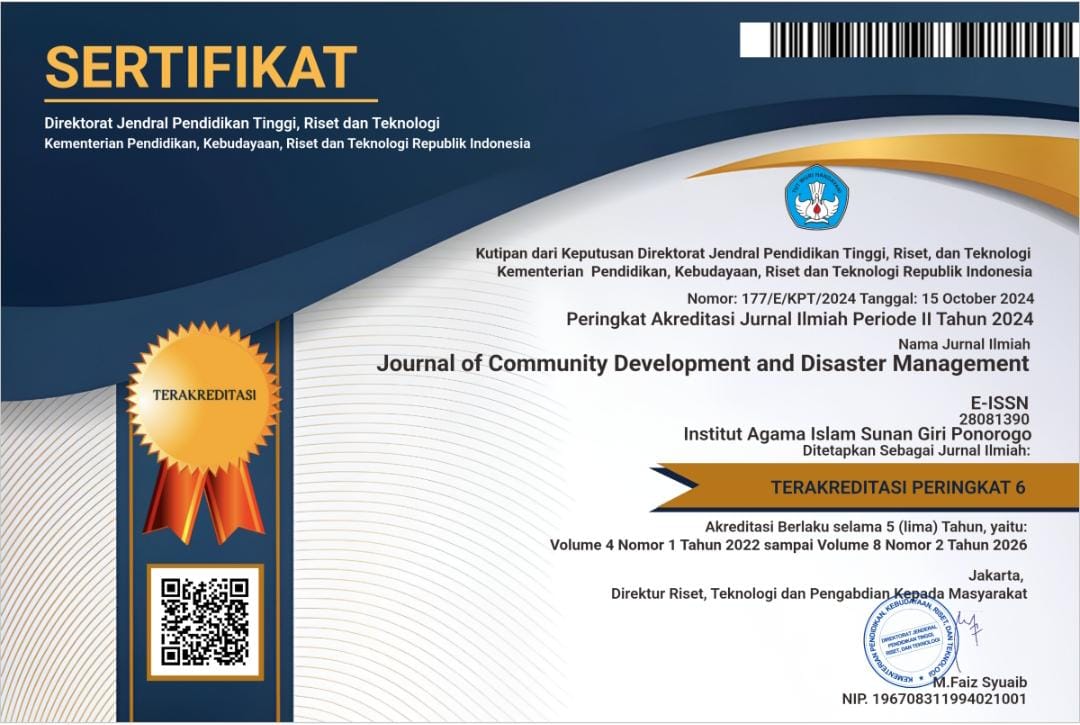Mindfulness-Based Cognitive Therapy (MBCT) Enhancing Emotion Regulation In Adults: A Scoping Review
DOI:
https://doi.org/10.37680/jcd.v7i2.7778Keywords:
MBCT; Emotion Regulation; Adult.Abstract
Mental disorders are a growing public health concern, with emotional regulation playing a crucial role in maintaining psychological well-being. Mindfulness Based Cognitive Therapy (MBCT) is a structured intervention that combines mindfulness practices with cognitive therapy to enhance emotional regulation. This scoping review aims to analyze the effectiveness of MBCT in improving emotional regulation in adults and to identify the specific aspects most influenced by the intervention. Using the Arksey and O’Malley framework, a systematic search was conducted in the Scopus and Web of Science databases for studies published between 2015 and 2025. Four quantitative studies met the inclusion criteria. The findings show that MBCT improves several emotional regulation components, including impulse control, emotional awareness and clarity, acceptance of emotional responses, and reduction in rumination. These improvements contribute to better emotional stability and resilience among adults facing psychological distress. The review supports the use of MBCT as a comprehensive therapeutic approach that promotes adaptive emotional responses and long term mental health. MBCT has the potential to be implemented in both clinical and community mental health settings as a preventive and promotive strategy.
References
Cladder-Micus, M. B., Becker, E. S., Spijker, J., Speckens, A. E. M., & Vrijsen, J. N. (2019). Effects of Mindfulness-Based Cognitive Therapy on a Behavioural Measure of Rumination in Patients with Chronic, Treatment-Resistant Depression. Cognitive Therapy and Research, 43(4), 666–678. https://doi.org/10.1007/s10608-019-09997-8
de Lemos, H. P. S., Matos, C. S. S., & de Aguiar, M. C. M. (2021). IMPACT OF DEPRESSION IN THE LABOR LIFE OF PATIENT WITH DEPRESSIVE DISORDER. Revista Brasileira de Neurologia e Psiquiatria, 25(3), 3–18. https://www.scopus.com/inward/record.uri?eid=2-s2.0-85171436996&partnerID=40&md5=0866ddebc03a8a9b2b055e367d061590
Deckersbach, T., Hölzel, B. K., Eisner, L. R., Stange, J. P., Peckham, A. D., Dougherty, D. D., Rauch, S. L., Lazar, S., & Nierenberg, A. A. (2021). Mindfulness-Based Cognitive Therapy for Nonremitted Patients with Bipolar Disorder. CNS Neuroscience and Therapeutics, 18(2), 133–141. https://doi.org/10.1111/j.1755-5949.2011.00236.x
Do, H. S., Lee, J., Yu, H., Lee, C. W., Hur, H. J., Lim, J., Kang, H. S., Park, J., Ha, T. H., & Myung, W. (2025). Relationship between emotion regulation skills, resilience, depression and anxiety symptom severity in patients with mood disorders and non-clinical participants: a mediation model. European Archives of Psychiatry and Clinical Neuroscience. https://doi.org/10.1007/s00406-025-02050-8
Effah, R., Ioannidis, K., Grant, J. E., & Chamberlain, S. R. (2024). Exploring decision-making performance in young adults with mental health disorders: a comparative study using the Cambridge gambling task. Psychological Medicine, 54(9), 1890–1896. https://doi.org/10.1017/S0033291724000746
Gross, J. J., & Thompson, R. (2007). Emotion regulation: Conceptual foundations. In J. J. Gross (Eds.) Handbook of Emotion Regulation (Issue July, pp. 3–24).
Hazlett-Stevens, H. (2022). Mindfulness-Based Interventions for Clinical Anxiety and Depression. In Biopsychosocial Factors of Stress, and Mindfulness for Stress Reduction (pp. 201–223). https://doi.org/10.1007/978-3-030-81245-4_9
Hosseinian, S., Shahtaheri, E., Ebrahimi, M., Mahdavi, A., & Sepahvandi, M. A. (2016). Effectiveness of mindfulness-based cognitive therapy and metacognition therapy on reduction of symptoms of depression, core self-evaluation and emotion regulation difficulties in pregnant women with depression. Acta Medica Mediterranea, 32(SpecialIssue5), 2033–2037.
Kim, M. Y., Bigman, Y., & Tamir, M. (2015). Emotional Regulation. In International Encyclopedia of the Social & Behavioral Sciences: Second Edition (pp. 452–456). https://doi.org/10.1016/B978-0-08-097086-8.25055-1
Loo, J. L., & Salmon, P. (2024). Mindfulness-Based Cognitive Therapy. In Tasman’s psychiatry, Fifth Edition (pp. 3717–3735). https://doi.org/10.1007/978-3-030-51366-5_75
Mackenzie, M. B., & Kocovski, N. L. (2016). Mindfulness-based cognitive therapy for depression: Trends and developments. Psychology Research and Behavior Management, 9, 125–132. https://doi.org/10.2147/PRBM.S63949
Marchand, W. R. (2013). Mindfulness Meditation Practices as Adjunctive Treatments for Psychiatric Disorders. Psychiatric Clinics of North America, 36(1), 141–152. https://doi.org/10.1016/j.psc.2013.01.002
Pandya, N., & Bhangaokar, R. (2023). Equal But Different: Views on Gender Roles and Responsibilities Among Upper-Class Hindu Indians in Established Adulthood. Journal of Adult Development, 30(1), 145–155. https://doi.org/10.1007/s10804-022-09417-4
Razavizadeh Tabadkan, B. Z., Jajarmi, M., & Vakili, Y. (2019). The effectiveness of mindfulness-based cognitive therapy on ruminative thoughts, perceived stress and difficulties in emotion regulation of women with type 2 diabetes. Iranian Journal of Psychiatry and Clinical Psychology, 24(4), 370–383. https://doi.org/10.32598/ijpcp.24.4.370
Redaksi Sehat Negeriku. (2021). Kemenkes Beberkan Masalah Permasalahan Kesehatan Jiwa di Indonesia. 07 Oktober. https://sehatnegeriku.kemkes.go.id/baca/rilis-media/20211007/1338675/kemenkes-beberkan-masalah-permasalahan-kesehatan-jiwa-di-indonesia/
Sala, L., Camart, N., Derval, A., & Rambaud, D. (2018). Preliminary results of mindfulness-based cognitive group therapy (MBCT) in social phobic patients. Annales Medico-Psychologiques, 176(5), 495–500. https://doi.org/10.1016/j.amp.2017.06.003
Selcuk, A. A. (2019). A Guide for Systematic Reviews: PRISMA. Turkish Archives of Otorhinolaryngology, 57(1), 57–58. https://doi.org/10.5152/tao.2019.4058
Tamir, M., & Gutentag, T. (2017). Desired emotional states: their nature, causes, and implications for emotion regulation. Current Opinion in Psychology, 17, 84–88. https://doi.org/10.1016/j.copsyc.2017.06.014
Ugargol, A. P., & Bailey, A. (2021). Reciprocity between older adults and their care-givers in emigrant households of Kerala, India. Ageing and Society, 41(8), 1699–1725. https://doi.org/10.1017/S0144686X19001685
Zysberg, L. (2023). Understanding emotion regulation. In Understanding Emotion Regulation. https://doi.org/10.52305/PIFQ8273
Downloads
Published
How to Cite
Issue
Section
License
Copyright (c) 2025 Septiani Haryati, Ainun Najib Febrya Rahman, Hanafi, Devi Harmita, Muhammad Luthfi, Dwin Seprian

This work is licensed under a Creative Commons Attribution-ShareAlike 4.0 International License.
JCD: Journal of Community Development and Disaster Management rekomendasi pencipta untuk memegang hak cipta tanpa batasan dan batasan pencipta untuk memiliki hak publikasi tanpa batasan, juga pemilik hak komersial atas artikel tersebut adalah pencipta.










